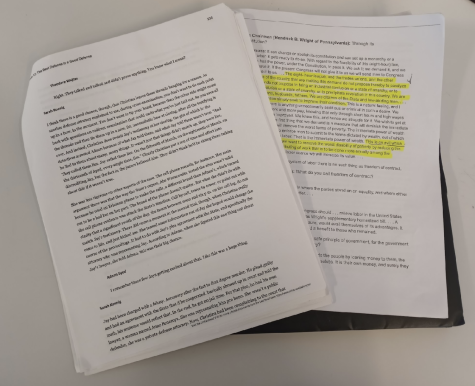Effective Success Strategies for School and Work

Having trouble with turning in assignments of a high quality is a common issue with high school students. Luckily, many students at DVC have adapted to strenuous academic circumstances with effective and reliable work completion strategies.
As many know, getting schoolwork done in a timely manner while maintaining its high quality isn’t always an easy thing to do. Schoolwork for numerous students oftentimes needs to be juggled with extracurricular activities like sports, volunteering, internships, and paid jobs.
There are multiple ways to tackle this issue, and one method is chiseling away one’s work–getting work done in small increments over an extended period of time. This way, work doesn’t get overwhelming for students and they still get at least 15-20 minutes of work done. However, for a project, the time spent on a single “chiseling session” might end up being 30 minutes to an hour.
Marcelo Aesbaucher, a DVC junior, provided more insight on the chiseling method.
“Well, like Miss Lolita has said before, chisel through your work. Like for example, if your assignment is due in–I don’t know–what two or three days from now, you can just get a little bit of it done today. And then a little bit of it is done tomorrow. I’m not necessarily completing everything on the same day,” he said.
When asked if the “chiseling” method worked for him, he responded with, “[It] did absolutely work for me and I believe that works for everyone.”
But then again, that’s just one method, and one student may prefer a different strategy over another. For example, there’s also a strategy called pre-planning. Pre-planning is exactly how it sounds–it means planning at least a day in advance what work needs to get done and creating an organized and dead set routine to achieve the goal of getting work done in a timely and efficient manner.
A DVC parent, Allan Talbert, explained how he conducts his pre-planning for his job, which can easily correlate to academic work as well.
“Well, first, I pre-plan my day the night before. Right? And then I prioritize the most important thing that needs to be done. And then I look to make sure how much time I have to complete my work and I look for things that might help me do it faster, like if I can organize my work better. And look to see if there are tools or things like that that can be made to prepare beforehand,” Talbert said.
Pre-planning helps make intentions, different assignments, and everyday tasks easier to manage overall. When one pre-plans, it’s harder to be thrown off course and way easier to keep themselves on track with meeting deadlines.
A third method for completing work is prioritizing, which entails deciding what work is more important to complete first. Prioritizing makes it clear what needs to be completed immediately versus what can wait until later. This leads to less confusion and higher clarity and overall productivity as well. Aston Turney, a diligent junior at DVC, shared how helpful prioritizing can be.
“It’s actually better to do the hard things first, I feel if you do the more difficult stuff first, you kind of get a good sense of how you can pace yourself throughout the week and everything will just flow naturally,” said Turney.